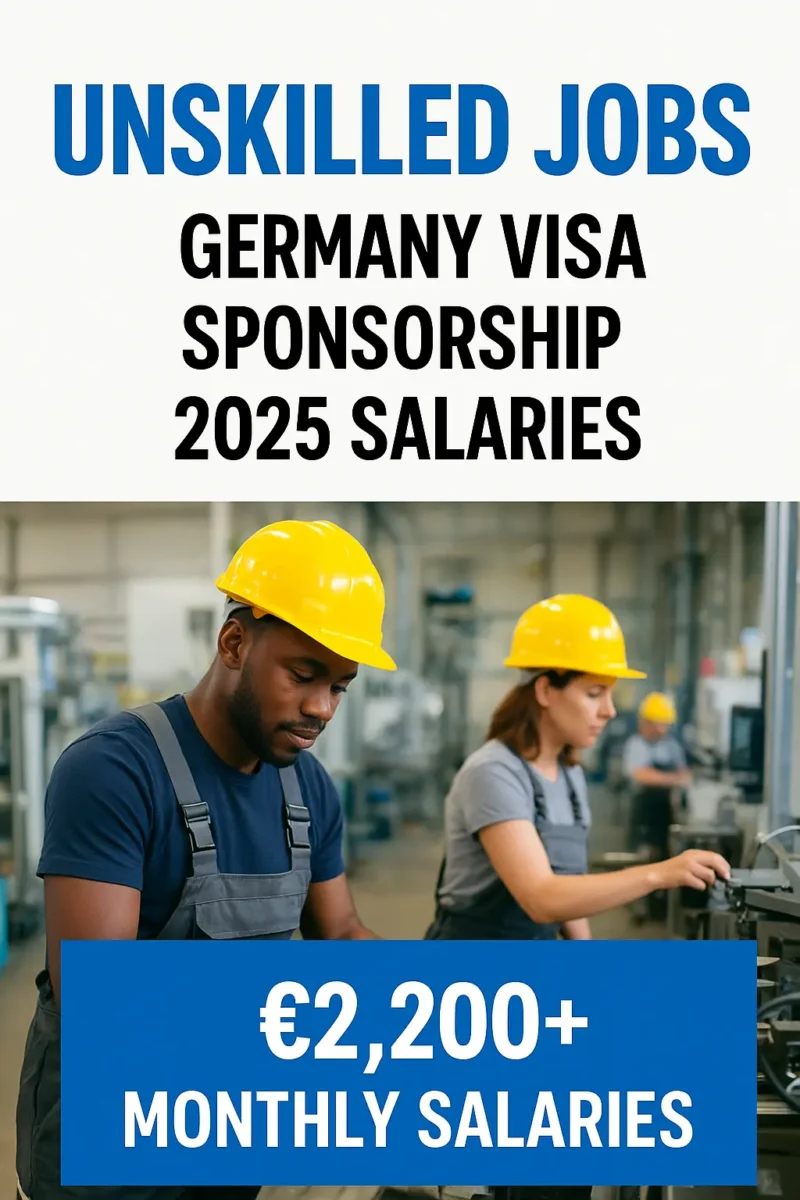Germany stands as one of Europe’s most attractive destinations for foreign workers seeking unskilled jobs Germany visa sponsorship opportunities without requiring specialized skills or higher education. With a robust economy, competitive wages, and comprehensive visa sponsorship programs, Germany offers thousands of unskilled jobs Germany visa sponsorship positions for foreigners in 2025. This comprehensive guide explores available opportunities, salary structures, visa requirements, and practical steps to secure unskilled jobs Germany visa sponsorship employment in Germany.
For more information about working in Europe, visit the Official EU Immigration Portal and check Germany’s Federal Employment Agency for current job listings.
Understanding Unskilled Jobs Germany Visa Sponsorship: Market Overview
The German labor market actively welcomes foreign workers to fill critical gaps through unskilled jobs Germany visa sponsorship programs in various sectors. Unskilled jobs Germany visa sponsorship opportunities encompass positions that require minimal formal training, basic language skills, and physical capability rather than specialized education. These roles form the backbone of Germany’s service, manufacturing, hospitality, and agricultural sectors.
Germany unskilled jobs visa sponsorship statistics and labor market data
Germany’s aging population and strong economic growth have created unprecedented demand for unskilled jobs Germany visa sponsorship workers. The government has streamlined immigration processes, making it easier for international candidates to obtain work permits and residence visas through established employers. Major industries actively sponsor visas for qualified foreign applicants, covering documentation costs and providing settlement support.
The country’s commitment to fair wages ensures that even unskilled positions offer competitive compensation. With a minimum wage structure that protects all workers, foreign employees can expect dignified earnings that support comfortable living standards in one of Europe’s wealthiest nations.
Top Unskilled Jobs Germany Visa Sponsorship Opportunities for Foreigners
Unskilled jobs Germany visa sponsorship in manufacturing sector
Manufacturing and Production Worker Visa Sponsorship
Manufacturing remains Germany’s industrial strength, with automotive, machinery, and chemical companies leading global markets offering unskilled jobs Germany visa sponsorship. Production line workers, quality control assistants, and packaging specialists represent significant opportunities for foreign workers seeking Germany visa sponsorship employment.
Monthly Salary Range: €2,200 – €2,800 (approximately $2,400 – $3,050) Hourly Rate: €13.50 – €17.00 (approximately $14.70 – $18.50)
Major employers including BMW, Mercedes-Benz, Volkswagen, and BASF regularly provide unskilled jobs Germany visa sponsorship for production workers. For current automotive job openings, check BMW Careers and Volkswagen Jobs. These positions offer excellent benefits packages, including health insurance, pension contributions, and professional development opportunities.
Warehouse and Logistics Germany Visa Sponsorship Jobs
Germany’s strategic location at the heart of Europe makes it a crucial logistics hub for unskilled jobs Germany visa sponsorship seekers. Amazon, DHL, and numerous distribution centers continuously recruit warehouse workers, forklift operators, and inventory specialists through visa sponsorship programs.
Warehouse unskilled jobs Germany visa sponsorship opportunities
Monthly Salary Range: €2,100 – €2,600 (approximately $2,290 – $2,830) Hourly Rate: €12.82 – €16.00 (approximately $13.95 – $17.40)
For warehouse opportunities, visit Amazon Jobs Germany and DHL Careers. These unskilled jobs Germany visa sponsorship positions often include shift differentials for night and weekend work, potentially increasing overall earnings by 15-25%.
Food Service Germany Visa Sponsorship Employment
Germany’s thriving hospitality sector offers numerous unskilled jobs Germany visa sponsorship opportunities for kitchen assistants, servers, dishwashers, and food preparation workers. Tourist destinations and major cities maintain constant demand for restaurant staff seeking Germany visa sponsorship.
Monthly Salary Range: €1,900 – €2,400 (approximately $2,070 – $2,610) Hourly Rate: €12.82 – €15.00 (approximately $13.95 – $16.30)
Tips and service charges can significantly supplement base wages for unskilled jobs Germany visa sponsorship positions, particularly in tourist areas and upscale establishments. Many positions include meal benefits and flexible scheduling.
Healthcare Support Worker Germany Visa Sponsorship
As Germany’s population ages, demand for healthcare support staff continues growing through unskilled jobs Germany visa sponsorship programs. Positions include patient care assistants, medical cleaning staff, and hospital maintenance workers.
Healthcare unskilled jobs Germany visa sponsorship in medical facilities
Monthly Salary Range: €2,000 – €2,500 (approximately $2,180 – $2,720) Hourly Rate: €12.82 – €15.50 (approximately $13.95 – $16.85)
For healthcare positions, explore Charité Berlin Careers and other major hospital networks. Healthcare unskilled jobs Germany visa sponsorship positions often provide additional benefits including extended vacation time and job security.
Agricultural and Seasonal Worker
Germany’s agricultural sector offers seasonal and year-round opportunities for farm workers, greenhouse assistants, and livestock care providers. These positions are particularly accessible for newcomers with limited German language skills.
Monthly Salary Range: €1,800 – €2,300 (approximately $1,960 – $2,500) Hourly Rate: €12.82 – €14.50 (approximately $13.95 – $15.80)
Seasonal work often includes accommodation and meals, significantly reducing living expenses. Many agricultural employers provide pathways to permanent employment for reliable workers.
Construction and Building Maintenance
Germany’s construction boom creates ongoing demand for general laborers, site cleaners, and maintenance assistants. These physically demanding roles offer competitive wages and advancement opportunities.
Monthly Salary Range: €2,300 – €2,900 (approximately $2,500 – $3,160) Hourly Rate: €14.00 – €18.00 (approximately $15.25 – $19.60)
Construction work often includes overtime opportunities and project bonuses. Safety training is provided, and many positions lead to apprenticeships in skilled trades.
Cleaning and Janitorial Services
Commercial and residential cleaning services maintain steady demand for reliable workers. Office cleaning, hotel housekeeping, and industrial cleaning offer flexible scheduling options.
Monthly Salary Range: €1,900 – €2,400 (approximately $2,070 – $2,610) Hourly Rate: €12.82 – €15.00 (approximately $13.95 – $16.30)
Part-time positions allow workers to combine multiple jobs or pursue language education. Many cleaning companies offer rapid advancement to supervisory roles.
Delivery and Transportation Assistant
E-commerce growth drives demand for delivery drivers, postal workers, and transportation assistants. These roles often require valid driving licenses but minimal additional qualifications.
Monthly Salary Range: €2,100 – €2,700 (approximately $2,290 – $2,940) Hourly Rate: €13.00 – €16.50 (approximately $14.15 – $17.95)
Delivery positions often include vehicle provision and fuel allowances. Performance bonuses and commission structures can increase earnings substantially.
Comprehensive Salary Breakdown: Unskilled Jobs Germany Visa Sponsorship Compensation
Salary breakdown unskilled jobs Germany visa sponsorship calculator
Minimum Wage Structure 2025 for Germany Visa Sponsorship Jobs
Germany’s minimum wage provides the foundation for all unskilled jobs Germany visa sponsorship compensation. As of January 2025, the minimum wage stands at €12.82 per hour, representing a significant increase from previous years. This rate applies to all workers, including foreign nationals with proper work authorization through unskilled jobs Germany visa sponsorship programs.
Hourly Minimum Wage: €12.82 ($13.95) Monthly Minimum Wage (full-time): €2,161 ($2,350) Annual Minimum Wage: €25,932 ($28,200)
For official wage information, consult the German Federal Ministry of Labour and current EU wage statistics.
Average Unskilled Jobs Germany Visa Sponsorship Worker Compensation
Most unskilled jobs Germany visa sponsorship positions in Germany pay above minimum wage, reflecting labor market competition and industry standards. The following breakdown represents typical compensation ranges for Germany visa sponsorship opportunities:
Entry-Level Positions:
- Hourly Rate: €12.82 – €14.00 ($13.95 – $15.25)
- Monthly Salary: €2,161 – €2,360 ($2,350 – $2,570)
- Annual Salary: €25,932 – €28,320 ($28,200 – $30,840)
Experienced Workers in Unskilled Jobs Germany Visa Sponsorship:
- Hourly Rate: €14.50 – €17.00 ($15.80 – $18.50)
- Monthly Salary: €2,445 – €2,867 ($2,660 – $3,120)
- Annual Salary: €29,340 – €34,404 ($31,940 – $37,440)
Learn more about our related guide on skilled immigration to Germany and EU work permit requirements for comprehensive employment information.
Premium Positions (High-demand sectors):
- Hourly Rate: €17.50 – €20.00 ($19.05 – $21.75)
- Monthly Salary: €2,953 – €3,373 ($3,210 – $3,670)
- Annual Salary: €35,436 – €40,476 ($38,560 – $44,040)
Regional Salary Variations
German salaries vary significantly by region, reflecting local cost of living and economic conditions:
Major Cities (Berlin, Munich, Hamburg, Frankfurt):
- Average hourly premium: +15-25% above national average
- Monthly salary range: €2,400 – €3,200 ($2,610 – $3,480)
Industrial Regions (Baden-Württemberg, North Rhine-Westphalia):
- Average hourly premium: +10-20% above national average
- Monthly salary range: €2,300 – €3,000 ($2,500 – $3,270)
Rural Areas and Eastern Germany:
- Salaries typically at or slightly below national average
- Monthly salary range: €2,100 – €2,600 ($2,290 – $2,830)
- Lower cost of living often compensates for reduced wages
Additional Compensation Benefits
German employment law mandates numerous benefits that significantly enhance total compensation:
Holiday Pay (Urlaubsgeld): Additional month’s salary paid before summer vacation Christmas Bonus (Weihnachtsgeld): Extra monthly payment in December Overtime Compensation: Time-and-a-half for hours exceeding standard workweek Shift Differentials: 10-25% premium for night, weekend, and holiday work
Germany Visa Sponsorship Process and Requirements for Unskilled Jobs
Germany visa sponsorship application process for unskilled jobs
Work Visa Categories for Unskilled Jobs Germany Visa Sponsorship
Germany offers several visa pathways for unskilled jobs Germany visa sponsorship seekers, each with specific requirements and processing procedures:
EU Blue Card for Vocational Training: Available for workers with completed vocational training, even in non-skilled roles Employment Visa (Aufenthaltserlaubnis): Standard work authorization for specific unskilled jobs Germany visa sponsorship offers Seasonal Worker Visa: Short-term authorization for agricultural and tourism sectors Working Holiday Visa: Available for citizens of partner countries aged 18-30
For detailed visa requirements, visit Germany Visa Info and Make-it-in-germany.com – the official German government portal for international professionals.
Employer Sponsorship Requirements
German employers sponsoring foreign workers must demonstrate:
- Labor Market Test: Proof that no EU citizens are available for the position
- Genuine Job Offer: Written employment contract with specified terms
- Salary Compliance: Wages meeting minimum standards and industry norms
- Company Registration: Valid business registration and tax compliance
Document Requirements for Applicants
Foreign workers seeking visa sponsorship must provide:
- Valid Passport: Minimum 12 months remaining validity
- Educational Certificates: Translated and authenticated documents
- Health Insurance: Coverage valid in Germany
- Financial Proof: Evidence of funds to support initial settlement
- Criminal Background Check: From country of origin and recent residence
- Language Proficiency: Basic German language certification (A1-A2 level)
Application Timeline and Process
The visa application process typically follows this timeline:
Weeks 1-2: Document preparation and translation Weeks 3-4: Application submission to German consulate Weeks 5-8: Processing and review by immigration authorities Weeks 9-10: Decision notification and passport return Weeks 11-12: Travel to Germany and registration with local authorities
Living Costs and Financial Planning
Housing Expenses
Accommodation represents the largest expense for foreign workers in Germany:
Shared Apartments:
- Major cities: €400-€700 monthly ($435-$760)
- Medium cities: €300-€500 monthly ($325-$545)
- Rural areas: €250-€400 monthly ($270-$435)
Single Apartments:
- Major cities: €800-€1,400 monthly ($870-$1,520)
- Medium cities: €600-€1,000 monthly ($650-$1,090)
- Rural areas: €450-€700 monthly ($490-$760)
Transportation Costs
Germany’s excellent public transportation system provides affordable mobility:
Monthly Public Transport Pass:
- Major cities: €80-€120 ($87-$130)
- Medium cities: €60-€90 ($65-$98)
- Rural areas: €40-€70 ($43-$76)
Bicycle Purchase: €200-€500 ($217-$545) one-time cost Car Ownership: €300-€500 monthly ($325-$545) including insurance and fuel
Food and Daily Expenses
German supermarkets offer affordable options for budget-conscious workers:
Monthly Grocery Budget:
- Economical shopping: €200-€300 ($217-$325)
- Moderate spending: €300-€450 ($325-$490)
- Comfortable budget: €450-€600 ($490-$650)
Restaurant Meals:
- Fast food: €8-€12 ($9-$13)
- Casual dining: €15-€25 ($16-$27)
- Fine dining: €30-€60+ ($33-$65+)
Healthcare and Insurance
Germany’s mandatory health insurance system provides comprehensive coverage:
Public Health Insurance: 14.6% of gross salary (shared with employer) Private Health Insurance: €200-€400 monthly ($217-$435) Additional Benefits: Dental care, prescription coverage, sick leave compensation
Language Requirements and Training Opportunities
Basic German Language Skills
While many unskilled positions don’t require fluency, basic German knowledge significantly improves employment prospects and workplace integration:
Minimum Level: A1-A2 (basic conversational ability) Recommended Level: B1 (intermediate proficiency) Workplace Communication: Industry-specific vocabulary and safety terminology
Free Language Learning Resources
Germany provides extensive language learning support for foreign workers:
Integration Courses (Integrationskurs): Government-funded German classes Employer Training: Company-sponsored language programs Online Resources: Deutsche Welle, Babbel, and other digital platforms Community Centers: Local volunteer tutoring and conversation groups
Professional Development Pathways
Unskilled positions often serve as stepping stones to skilled careers:
Apprenticeship Programs: Dual education system combining work and study Vocational Training: Specialized certification in trades and technical skills University Pathways: Access to higher education through work experience Internal Promotion: Career advancement within sponsoring companies
Major Employers Offering Visa Sponsorship
Manufacturing Giants
Germany’s industrial leaders actively recruit foreign workers:
Automotive Sector:
- BMW Group: Production and logistics positions
- Mercedes-Benz: Assembly line and quality control roles
- Volkswagen AG: Manufacturing and warehouse operations
- Audi AG: Production support and maintenance positions
Chemical and Pharmaceutical:
- BASF SE: Production and laboratory assistant roles
- Bayer AG: Manufacturing and packaging positions
- Merck KGaA: Production support and quality assurance
Logistics and E-commerce
Amazon Germany: Warehouse operations and delivery services DHL Group: Sorting, packaging, and transportation roles Hermes Germany: Delivery and customer service positions DB Schenker: Warehouse and logistics coordination
Hospitality and Tourism
Hotel Chains:
- Maritim Hotels: Housekeeping and food service
- Steigenberger Hotels: Restaurant and maintenance staff
- NH Hotel Group: Front desk and cleaning services
Restaurant Groups:
- McDonald’s Germany: Food preparation and customer service
- Burger King: Kitchen and service positions
- Local restaurant chains: Various service roles
Healthcare and Social Services
Hospital Networks:
- Charité Berlin: Patient care and facility maintenance
- Universitätsklinikum Hamburg: Cleaning and food service
- Klinikum Stuttgart: Transportation and administrative support
Regional Job Markets and Opportunities
Bavaria (Bayern)
Bavaria offers the highest concentration of manufacturing jobs, particularly in automotive and technology sectors. Munich and Nuremberg provide numerous opportunities with above-average wages.
Key Industries: Automotive, aerospace, technology Average Monthly Salary: €2,400-€3,200 ($2,610-$3,480) Major Employers: BMW, Audi, Siemens, MAN
North Rhine-Westphalia
Germany’s most populous state features diverse industries including steel, chemicals, and logistics. Cities like Cologne, Düsseldorf, and Dortmund offer extensive employment opportunities.
Key Industries: Chemical, steel, logistics, agriculture Average Monthly Salary: €2,200-€2,900 ($2,390-$3,160) Major Employers: Bayer, ThyssenKrupp, Deutsche Post
Baden-Württemberg
Home to Stuttgart and numerous automotive suppliers, this region provides excellent opportunities for manufacturing and engineering support roles.
Key Industries: Automotive, machinery, textiles Average Monthly Salary: €2,300-€3,000 ($2,500-$3,270) Major Employers: Mercedes-Benz, Porsche, Robert Bosch
Berlin and Brandenburg
The capital region offers diverse opportunities in hospitality, logistics, and emerging technology sectors. Lower living costs compared to wages provide excellent value.
Key Industries: Hospitality, logistics, construction, technology Average Monthly Salary: €2,100-€2,700 ($2,290-$2,940) Major Employers: Amazon, various hotel chains, construction companies
Application Strategies and Job Search Techniques
Online Job Portals
StepStone.de: Germany’s leading job platform with English interface Xing.com: Professional networking and job listings Indeed.de: International job search with German positions Jobs.de: Comprehensive employment opportunities across sectors Arbeitsagentur.de: Official government employment service
Direct Employer Applications
Many companies prefer direct applications through their websites. Research target employers and submit applications through their career portals, emphasizing visa sponsorship requirements.
Recruitment Agencies
Specialized agencies assist foreign workers with job placement and visa processes:
Randstad Germany: International staffing with visa support Adecco Germany: Temporary and permanent placement services Manpower Germany: Industrial and service sector opportunities
Networking and Community Resources
German-American Chambers of Commerce: Business networking events International Community Centers: Local support and connections Professional Associations: Industry-specific networking opportunities Social Media Groups: Facebook and LinkedIn communities for foreign workers
Legal Rights and Worker Protections
Employment Law Protections
German labor law provides comprehensive protections for all workers, including foreign nationals:
Working Hours: Maximum 48 hours per week, with overtime restrictions Vacation Time: Minimum 24 days annually, with many employers offering more Sick Leave: Full salary continuation for up to six weeks Notice Periods: Protection against arbitrary dismissal
Union Representation
German trade unions welcome foreign workers and provide:
Collective Bargaining: Industry-wide wage negotiations Legal Support: Assistance with employment disputes Training Programs: Professional development opportunities Social Services: Integration support and community resources
Discrimination Protection
German law prohibits employment discrimination based on:
Nationality: Equal treatment for all authorized workers Religion: Freedom of religious practice and accommodation Gender: Equal pay and advancement opportunities Age: Protection against age-based employment decisions
Success Stories and Career Advancement
From Unskilled to Skilled: Real Pathways
Many foreign workers successfully transition from unskilled positions to professional careers:
Maria from Spain: Started as a hotel housekeeper, completed hospitality management training, now manages hotel operations Ahmed from Morocco: Began in warehouse work, earned forklift certification and logistics training, promoted to team leader Priya from India: Started in food service, learned German, completed culinary training, now works as a chef
Long-term Career Development
Apprenticeship Opportunities: Many employers sponsor foreign workers for formal training programs University Access: Work experience can qualify workers for higher education programs Entrepreneurship Support: Germany encourages foreign workers to start businesses Permanent Residency: Stable employment leads to long-term residency status
Conclusion: Your Gateway to German Employment
Unskilled jobs in Germany for foreigners with visa sponsorship represent genuine opportunities for career advancement and improved quality of life. With competitive salaries ranging from €2,161 to €3,373 monthly ($2,350 to $3,670), comprehensive benefits, and pathways to permanent residency, Germany offers one of Europe’s most attractive employment packages for international workers.
The combination of fair wages, worker protections, and professional development opportunities makes Germany an ideal destination for foreign workers seeking to build successful careers. Whether starting in manufacturing, hospitality, logistics, or healthcare support, unskilled positions provide solid foundations for long-term success in one of the world’s strongest economies.
Success in the German job market requires preparation, including basic language skills, proper documentation, and understanding of local workplace culture. However, with determination and the right approach, foreign workers can secure visa sponsorship and begin rewarding careers in Germany.
The 2025/2026 period presents exceptional opportunities as Germany continues expanding its workforce to meet growing economic demands. With streamlined visa processes and active employer recruitment, qualified foreign workers have never had better prospects for securing employment with full legal authorization and comprehensive support.
Take the first step toward your German career by researching target employers, preparing required documents, and beginning German language study. Your future in Germany’s dynamic economy awaits, with the promise of competitive wages, professional growth, and the security of one of Europe’s most prosperous nations.







